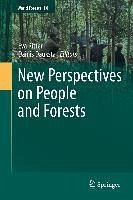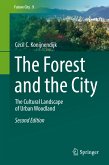Given the wide range of forest landscapes, and cultural perspectives which exist across the world, the book focuses on Europe as a test case to explore the various relationships between society, culture, forests and landscapes. It looks at historical evidence of the impacts of people on forests and vice versa, explores the current factors affecting people's physical and emotional comfort in forest landscapes, and looks ahead to how changes in forest cover may alter the present relationships of people to forests.
Drawing together a diverse literature and combining the expertise of natural and social scientists, this book will form a valuable reference for students and researchers working in the fields of landscape ecology and landscape architecture, geography, social science, environmental psychology orenvironmental history. It will also be of interest to researchers, government agencies and practitioners with an interest in issues such as sustainable forest management, sustainable tourism, reserve management, urban planning and environmental interpretation.
Dieser Download kann aus rechtlichen Gründen nur mit Rechnungsadresse in A, B, BG, CY, CZ, D, DK, EW, E, FIN, F, GR, HR, H, IRL, I, LT, L, LR, M, NL, PL, P, R, S, SLO, SK ausgeliefert werden.
"The book is the exploration of the cultural, biological, spiritual, economic, and emotional components of the forested landscape of northern Europe from the earliest records of interactions between humans and forests to the present day. ... This volume should certainly be considered as part of the literature of landscape ecology, as it considers throughout the interactions between humans, forests, and forested landscapes. ... For those with a humanistic or philosophical bent, it is likely a worthwhile read ... ." (Ralph E. J. Boerner, Landscape Ecology, Vol. 27, 2012)









